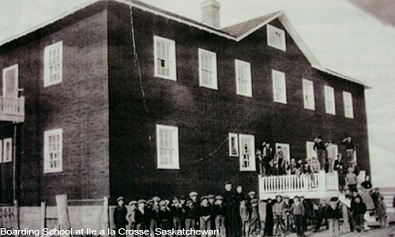WARNING: Disturbing content
Negotiations between survivors of the Ile a la Crosse residential school and the federal government could soon begin.
Crown-Indigenous Relations Minister Marc Miller said he wants to sit with the plaintiffs of a civil suit as soon as possible to start discussions.
“The Government of Canada is willing to step up to the plate and settle its portion of the liability with survivors and support their claims,” Miller said.
Jimmy Durocher, a survivor of the Ile a la Crosse Boarding School, has long advocated for the school to be recognized, as it was left out of the Indian Residential School Settlement Package in the early 2000’s.
Approximately 1500 First Nations and Metis children from northern Saskatchewan were forced to attend the Ile a la Crosse school from the 1860’s to the 1970’s, making it one of Canada’s oldest residential schools.
“The Ile a la Crosse Residential School had all the trappings of a residential school, but was excluded from the IRS settlement. It was a school that had mostly Metis and First Nations individuals taken to it. The people at that school suffered much the same horrors as anyone else that achieved compensation under the IRS settlement. And to this day though, those survivors have not achieved any form of legal settlement,” explained Miller.
The Saskatchewan government has long held that it was not responsible for the Ile a la Crosse residential school, because it did not own or operate it. The province regularly withholds further comment on this, citing pending litigation.
Miller expressed frustration with what he described as a lack of willingness from Saskatchewan to engage on the file.
Earlier this year, he submitted a Freedom of Information Act request with the Sask. Government for Ile a la Crosse residential school documentation to determine legal risk ahead of potential negotiations.
“This was a school principally administered by the Government of Saskatchewan. To this day the Government of Saskatchewan has not stepped up to the plate to compensate those survivors, who are entitled to a measure of financial compensation and a measure of closure for that matter,” said Miller.
He described the situation as not being an overly complicated legal matter, recognizing that many survivors are aging, stressing the importance of finalizing a deal.
Miller did not say when negotiations would start, or offer an opening dollar figure, adding it should not be as cumbersome as the IRS settlement.
Support is available for those affected by their experience at Indian Residential Schools and in reading difficult stories related to residential school. The Indian Residential School Crisis Line offers emotional and referral services 24 hours a day at 1-866-925-4419. In Saskatchewan, the Regina Treaty Status Indian Services at 306-522-7494.
